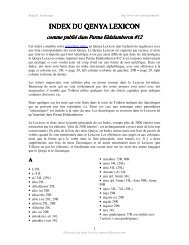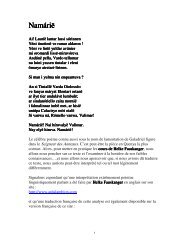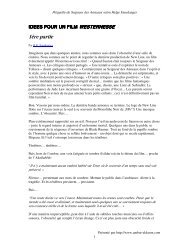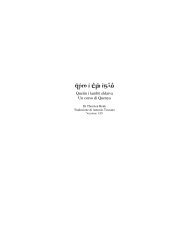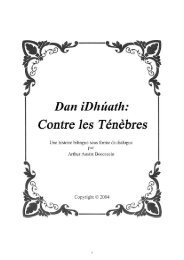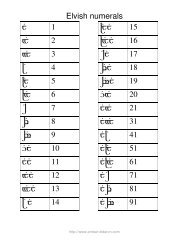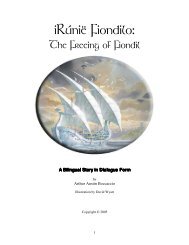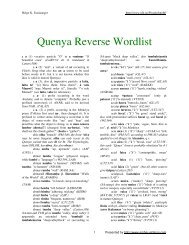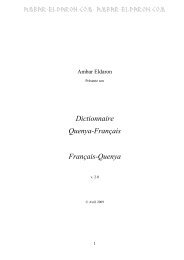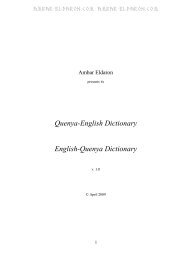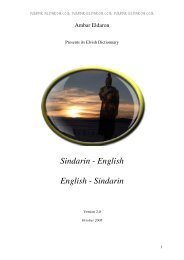English – Quenya - Ambar Eldaron
English – Quenya - Ambar Eldaron
English – Quenya - Ambar Eldaron
Create successful ePaper yourself
Turn your PDF publications into a flip-book with our unique Google optimized e-Paper software.
Helge K. Fauskanger http://www.uib.no/People/hnohf/<br />
ADULT (adj) vëa (manly, vigorous);<br />
ADULT MAN vëaner; ADULT MALE nér (ner-,<br />
as in. pl neri) (man) <strong>–</strong>WEG, DER<br />
ADÛNAKHOR Herunúmen <strong>–</strong>UT:222,<br />
Silm:322<br />
AEGNOR Aicanáro (so in Silm:435 and<br />
PM:345; MR:323 has Aicanár) (Sharp Flame,<br />
Fell Fire)<br />
AFFECT #ap- (given as aorist stem apë)<br />
(to concern, to touch one) <strong>–</strong>VT44:26<br />
AFFECTIONATE méla (loving) <strong>–</strong>VT39:10<br />
AFFLICTED <strong>–</strong> be afflicted: moia- (labour).<br />
The participle *moiala may then be used to<br />
translate "afflicted" as an adjective, describing<br />
one who is "labouring" or toiling as a thrall. <strong>–</strong><br />
VT43:31<br />
AFTER apa (also attested in compounds<br />
like Apanónar, see below), #ep- (used in<br />
compounds when the second part of the<br />
compound begins with a vowel, only attested in<br />
epessë "after-name" <strong>–</strong> see NICKNAME.) This<br />
ep- is a shorter form of epë, which means<br />
“before” of spatial relationships but “after” of time<br />
(since the Eldar imagined time coming after their<br />
present as being before them, VT49:12); apa<br />
and epë may be seen as variants of the same<br />
word. Other variant forms of apa "after" include<br />
opo and pó/po (VT44:36, VT49:12). According<br />
to VT44:26, the preposition apa may also appear<br />
as pa, pá (cf. yéni pa yéni "years after years" in<br />
VT44:35), but pa/pá is in other manuscripts<br />
defined as "touching, as regards, concerning".<br />
THE AFTER-BORN Apanónar (sg #Apanóna)<br />
(i.e., an Elvish name of Men, according to<br />
WJ:387 "a word of lore, not used in daily<br />
speech") <strong>–</strong>Silm:122/WJ:387, UT:266<br />
AGAIN ata; AGAIN (prefix) en-, (prefix) at-<br />
, ata- (back-, re-) (AT[AT])<br />
AGAINST: According to VT44:26, Tolkien<br />
in some documents glosses apa or pá as<br />
"touching, against", but apa is normally the<br />
preposition "after" instead (see AFTER). The<br />
allative case in -nna is normally sufficient to<br />
express motion towards or against something.<br />
Possibly this ending can also take on the<br />
meaning of “against” with connotations of enmity<br />
and confrontation, as when the pl. allative<br />
valannar is used in the phrase *“made war<br />
on/against the Valar” (LR:47).%<br />
AGE randa (cycle) (as in “the Third Age”;<br />
not the age of a person); AGES OF AGES<br />
yénion yéni <strong>–</strong>RAD, VT44:36<br />
AGENT tyaro (actor, doer) <strong>–</strong>KAR<br />
AGILE tyelca (swift) <strong>–</strong>KYELEK<br />
AGO yá; LONG AGO andanéya, anda né<br />
(once upon a time) <strong>–</strong>YA, VT49:31<br />
AGONY qualmë (death), unqualë (death;<br />
according to VT45:24, Tolkien changed this word<br />
to anqualë) <strong>–</strong>KWAL, VT45:5, 24, 36<br />
AH (interj.) ai (alas) Ai! laurië lantar lassi<br />
Ah! golden fall the leaves (Nam)<br />
AIR vista (= air as substance); vilya older<br />
[MET] wilya (sky); vilma (lower air) (perhaps<br />
changed to vista, but vilma was not struck out in<br />
Etym); lindë (tune, song, singing); PUFF OF AIR<br />
hwesta (breeze, breath); UPPER AIRS AND<br />
CLOUDS fanyarë (skies), AIRY vilin (breezy) <strong>–</strong><br />
WIS, WIL/LT1:273, LIN, SWES/LotR:1157,<br />
MC:223, LT1:273<br />
ALAS (interj.) ai (ah) (Etym also gives a<br />
word nai, but this clashes with nai "be it that" in<br />
Namárië.); also orro or horro as an<br />
"exclamation of horror, pain, disgust: ugh, alas!<br />
ow!" <strong>–</strong>Nam/RGEO:66, NAY, VT45:17<br />
ALIKE véla <strong>–</strong>VT49:10<br />
ALIVE cuina; BEING ALIVE (noun not adj)<br />
cuilë (life) (LT1:257 gives coina, coirëa; see<br />
LIVING) <strong>–</strong>KUY<br />
ALL illi (as independent noun), also ilya<br />
(all of a particular group of things, the whole,<br />
each, every) (Note: ilya normally appears as ilyë<br />
before a plural noun: ilyë tier "abll paths");<br />
ALLNESS, THE ALL ilúvë (the whole).<br />
According to early material, ALL THE... (followed<br />
by some noun) is rendered by i quanda, e.g. *i<br />
quanda cemen "all the earth; the whole earth".<br />
ALL THAT IS WANTED fárë, farmë (plenitude,<br />
sufficiency) <strong>–</strong>VT47:30, VT39:20, VT44:9, IL,<br />
Nam cf. RGEO:67, Silm:433/WJ:402, QL:70,<br />
PHAR/VT46:9<br />
ALLOW lav- (yield, grant); NOT ALLOW<br />
TO CONTINUE nuhta- (stunt, prevent from<br />
coming to completion, stop short) <strong>–</strong>DAB, WJ:413<br />
ALONE (see also LONELY, SOLE) er<br />
(one, alone, only, but, still), eressë (singly, only,<br />
also as noun: solitude) <strong>–</strong>ERE, LT1:269<br />
ALPHABET tengwanda <strong>–</strong>TEK<br />
ALSO yando <strong>–</strong>QL:104<br />
ALTHOUGH (or "nothwithstanding") <strong>–</strong><br />
Christopher Gilson argues that the word ómu<br />
occurring in an untranslated "Qenya" text could<br />
have this meaning (PE15:32, 37). If this<br />
interpretation is regarded as too uncertain, the<br />
idea expressed by phrases involving "(al)though"<br />
may be rephrased using ananta "and yet" (e.g.<br />
"although the house is small, we love it" > *i coa<br />
pitya ná, ananta melilmes = "the house is<br />
small, and yet we love it").%<br />
ALWAYS illumë (earlier variants of the<br />
relevant text also have vora and vorë, forms<br />
Tolkien may or may not have abandoned) <strong>–</strong><br />
VT44:9<br />
Wordlist last updated July 5th, 2008 4 Presented by http://www.ambar-eldaron.com



